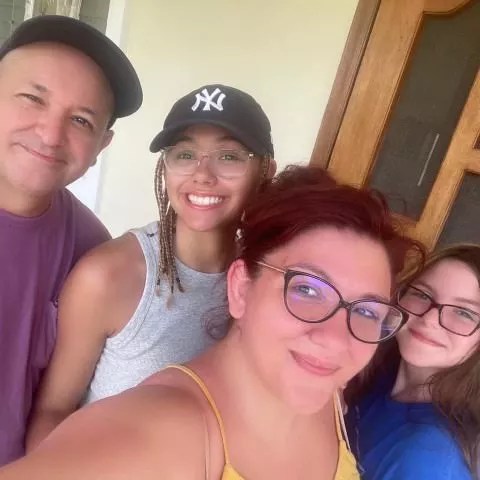
Courtesy of Farah Broomandi

Audio By Carbonatix
On December 30, Governor Jared Polis pardoned Henry Cruz Moreno, a Colorado family man who was deported to Honduras in May 2019 because of an old felony conviction.
“I felt happy,” says 49-year-old Cruz Moreno, who is currently living in Honduras where his wife, Priscilla, is visiting him over the holidays. “I was hugging her. I was jumping up and down here. We were both crying.”
“The fight isn’t over,” adds Priscilla, who lives with her daughter Farah Broomandi, as well as Broomandi’s nineteen- and twelve-year-old daughters, in metro Denver, “But that’s okay. We’re going to continue. At least we have a fighting chance, whereas before we were dead in the water. We were dead in the water.”
Immigration and Customs Enforcement deported Cruz Moreno in 2019 over a past felony conviction in Arapahoe County. In 2001, Cruz Moreno, who entered the U.S. without documentation in the mid-’90s, pleaded guilty to a felony menacing charge in relation to an alcohol-fueled dispute that he had with Priscilla.
After his guilty plea, Cruz Moreno spent two and a half months in jail and then successfully completed domestic violence and drug and alcohol treatment courses.
Upon his release from jail, Cruz Moreno was detained by ICE on the grounds that he had committed a felony offense. He opted for a voluntary departure from the U.S. in September 2002, which allowed him to avoid a deportation note on his immigration file.
Priscilla and Cruz Moreno anticipated that he would only be gone for a short time and that he could apply for legal immigration status at the U.S. consulate in Honduras. But that petition was denied, so Cruz Moreno came back to the U.S. without papers.
Back in Denver, Cruz Moreno established a successful carpet-cleaning business. He also became a loving grandfather to the children of his stepdaughter. And he and Priscilla also worked on their own lives, becoming church-goers and getting a handle on their drinking.
There was always a concern that Cruz Moreno’s immigration status could come back to haunt him, so the family kept a low profile and didn’t mention his immigration status to many people. But that wasn’t enough. In September 2018, ICE detained Cruz Moreno as he was going to work and locked him in the Aurora Contract Detention Facility.
Since Cruz Moreno is married to a U.S. citizen, he normally would have had a good shot at a cancellation of removal. The underlying felony conviction hurt those odds, however. So while Cruz Moreno was detained, Priscilla and Broomandi began advocating heavily for the governor to pardon him. State lawmakers also sent letters to the governor’s office, hoping for a positive outcome.
But the initial advocacy didn’t work, and Cruz Moreno was deported in May 2019.

Henry Cruz Moreno has a stepdaughter, Farah Broomandi, and two granddaughters.
Courtesy of Farah Broomandi
The separation of the family had devastating consequences, especially for Priscilla, who eventually lost her job. Broomandi, a single mother, was forced to sell her house and move in with Priscilla to take care of her mother’s health issues.
“It has uprooted everything,” Broomandi says.
It’s been difficult for Cruz Moreno,too; he’s been living in a country that has huge issues with organized crime and corruption. “Over here, there’s a lot of that extortion going on,” Cruz Moreno says. Priscilla would visit him periodically, spending weeks at a time in Honduras.
She and Broomandi refused to let up and continued their advocacy, constantly reaching out to the governor’s office.
“I called incessantly. I would say over the span of three years, I personally probably sent fifty postcards and left a hundred messages, and we at one point had thousands of people calling the governor’s office,” Broomandi says.
A few months ago, Priscilla received a call from someone from the state’s clemency board. They had a lengthy chat, she recalls, and the caller eventually started crying after hearing about Cruz Moreno’s case. The call ended with some parting words from the clemency employee: Take this call as a positive sign.
A positive sign, indeed. On December 30, Polis issued a full and unconditional pardon, with a letter attached.
“Many people with criminal histories desire a second chance, and you have earned one,” Polis wrote. “Since your conviction you rededicated yourself to living as a good citizen. You have overcome your struggles with addiction. You supported your wife and children through illnesses. Your family describes you as their rock and source of comfort. You set up informal food pantries for those in need. Neighbors and friends describe you as someone they can rely on for support during tough times. You owned an upholstery and carpet-cleaning business for 9 years.”
While she’s been visiting Cruz Moreno in Honduras over the past month, Priscilla didn’t have her phone on. She’d received notices that someone has been trying to call her, but no phone number was attached to the messages. So she was caught totally off guard when she learned about Cruz Moreno’s pardon while she was sitting on the front porch with her husband on the evening of December 30.
“This is the most awesome gift ever that we could receive,” Priscilla says.
“I can’t breathe, I’m so happy,” Broomandi says, finally hearing the news back in metro Denver.
The battle to get Cruz Moreno back to the U.S. still isn’t over. He and his wife want to take the legal route, and they know it will still be an uphill climb for Cruz Moreno to gain legal immigration status.
But what they call “the biggest obstacle,” the felony conviction, is now out of the way.
Concludes Broomandi: “We have hope, something that we haven’t had in a long time.”.